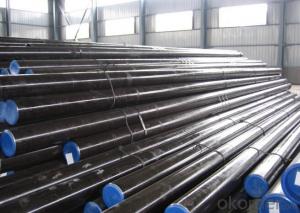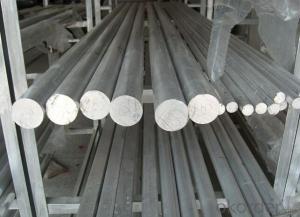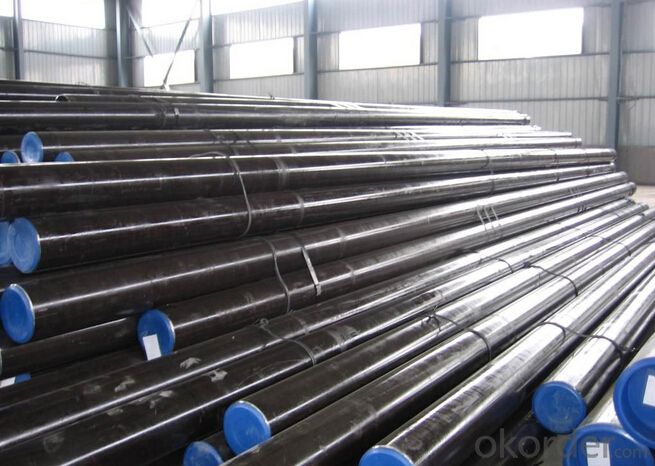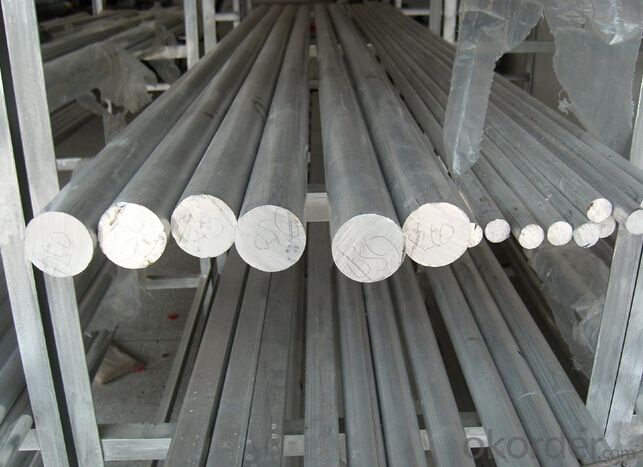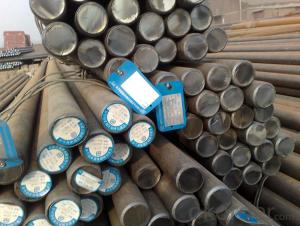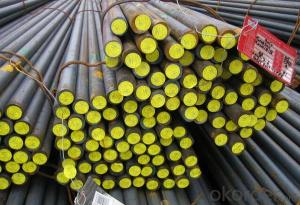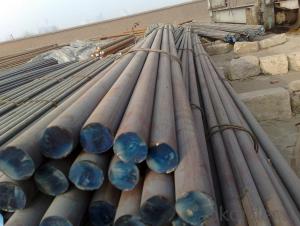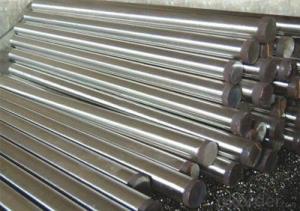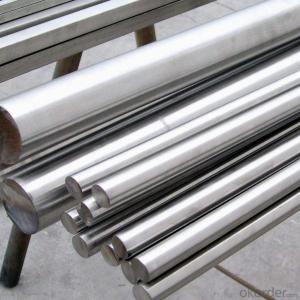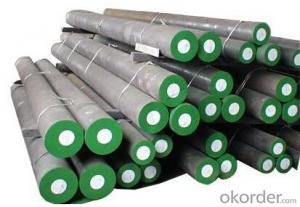Round Bar Alloy Steel SAE5160 Spring Steel Special Steel
- Loading Port:
- China main port
- Payment Terms:
- TT OR LC
- Min Order Qty:
- 30 m.t.
- Supply Capability:
- 10000 m.t./month
OKorder Service Pledge
OKorder Financial Service
You Might Also Like
Specification
SAE5160 Spring Steel
1. Material: 65Mn, 60Si2Mn, 50CrVA, SUP-9 etc.
2. Type: Smooth Plain, Double grooved.
3. Specifications: A variety of sizes from 5*45 to 30*150mm. We can produce according to customers' requirements, can customize for you.
4.Features: high strength & toughness; good hardenability & plasticity; excellent decarburization
; strong resistance & good elasticity; perfect machinability
5. Usage: Automobile laminated leaf spring, agricultural machinery & implements(rotary coulter), tools and machines etc.
6. Packing: Standard seaworthy packing or as customer required
7. Application: High strength, high toughness, large sectionand and important modified parts
Product show
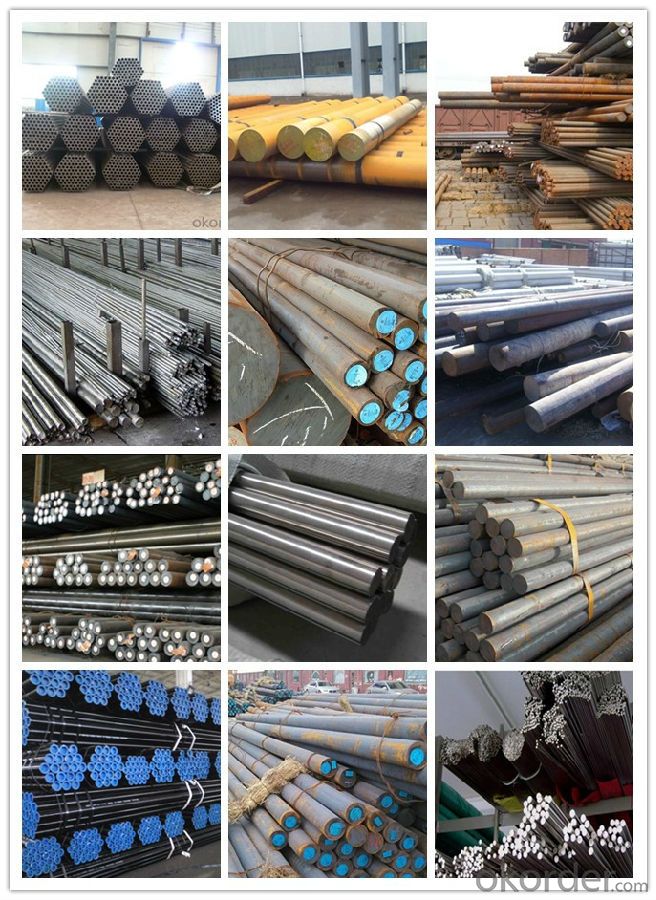
Workshop show
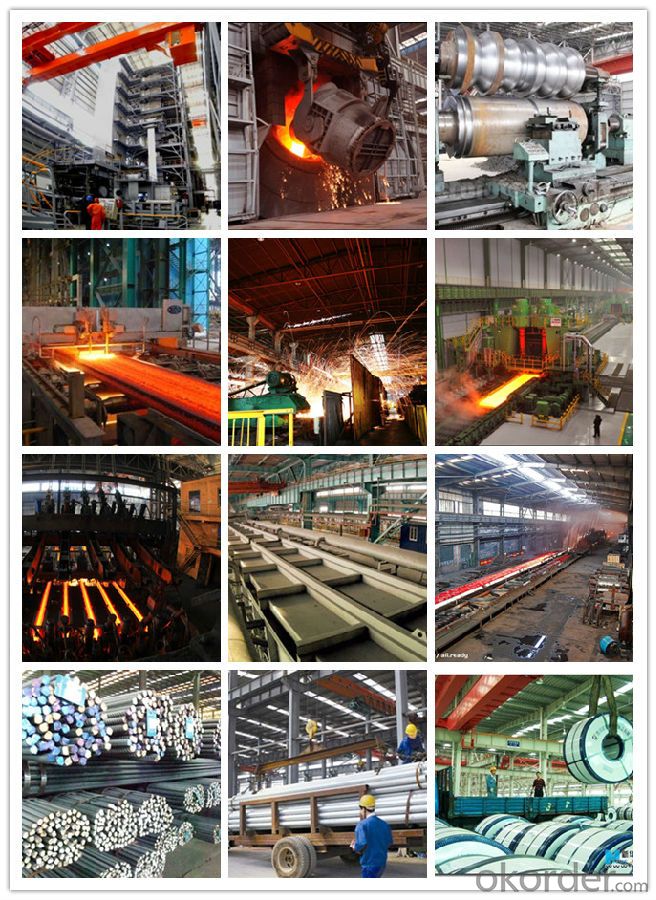
Shipping
1. FedEx/DHL/UPS/TNT for samples, Door-to-Door;
2. By Air or by Sea for batch goods, for FCL; Airport/ Port receiving;
3. Customers specifying freight forwarders or negotiable shipping methods!
Delivery Time: 3-7 days for samples; 5-25 days for batch goods.
Payment Terms
1.Payment: T/T, L/C, Western Union, MoneyGram,PayPal; 30% deposits; 70% balance before delivery.
2.MOQ: 1pcs
3.Warranty : 3 years
4.Package Informations: 1) EXPORT, In 20 feet (GW 25 ton) or 40 feet Container (GW 25 ton)
2)as customer's requirement
Main Product
Plastic Mould Steel
DIN 1.2311,1.2738,1.2083,1.2316 etc.
AISI P20,P20+Ni,420 etc.
JIS SUS420J2
Hot Work Steel
DIN 1.2344,1.2343,1.2367,1.2365,1.2581,1.2713 etc.
AISI H13,H11,H10,H21, etc.
JIS SKD61,SKD6,SKD5,SKT4 etc.
Cold Work Steel
DIN 1.2739, 1.2601, 1.2080, 1.2436, 1.2631, 1.263, 1.2510, 1.2327 etc.
AISI D2, D5, D3, D6, A8, A2, O1 etc.
JIS SKD10, SKD11, SKD1, SKS3 etc.
High Speed Steel
DIN 1.3343, 1.3243, 1.3247, 1.3355 etc.
AISI M2, M35, M42, T1 etc.
JIS SKH51, SKH35, SKH59, SKH2 etc.
Alloy Structural Steel
DIN 1.7035,1.6511,1.7220,1.7225 etc.
AISI 5140, 4340, 4135, 4140 etc.
JIS SCr440,SNCM439,SCM435,SCM440 etc.
Stainless & Carbon Steel or Others
DIN 1.4125,1.1191 etc
AISI 440C,1045, 1020 etc.
JIS SUS440C,S45C etc
Why choose us?
(1) The leading exporter in China special steel industry.
(2) Large stocks for various sizes, fast delivery date.
(3) Good business relationship with China famous factories.
(4) More than 7 years steel exporting experience.
(5) Good after-sales service guarantee.
- Q: How does special steel contribute to reducing product rejection rates?
- Special steel contributes to reducing product rejection rates by offering superior strength, durability, and corrosion resistance. It enables manufacturers to produce high-quality products that meet stringent specifications and standards. Special steel's precise composition and unique properties enhance the performance and reliability of the end products, reducing the chances of defects, failures, and rejections.
- Q: How does special steel contribute to the aerospace material recyclability?
- Special steel contributes to the aerospace material recyclability by offering high durability and strength, making it a preferred material for various aircraft components. Its recyclability is enhanced through processes such as melting and reformation, allowing the steel to be reused in new applications. This reduces the need for new steel production, conserves resources, and minimizes waste generation in the aerospace industry.
- Q: What are the thermal properties of special steel?
- Special steels have unique thermal properties that make them highly desirable in various applications. One of the key thermal properties of special steel is its high thermal conductivity. This means that it is able to efficiently transfer and dissipate heat. This property makes special steel ideal for use in heat exchangers, where it can effectively transfer heat between fluids. Additionally, special steel has a high melting point, which allows it to withstand high temperatures without deforming or losing its structural integrity. This makes it suitable for applications that involve exposure to extreme heat, such as in furnaces or aerospace engines. Furthermore, special steel exhibits excellent thermal expansion properties. It expands and contracts at a relatively consistent rate with changes in temperature, minimizing the risk of warping or cracking. This property is particularly important in applications where dimensional stability is crucial, such as in precision instruments or high-temperature machinery. Moreover, special steel can also possess good resistance to thermal fatigue. This means that it can withstand repeated heating and cooling cycles without developing cracks or weakening. This property is especially beneficial in applications that involve cyclic thermal loading, such as in automotive engine components or turbine blades. In summary, special steel possesses high thermal conductivity, a high melting point, excellent thermal expansion properties, and resistance to thermal fatigue. These thermal properties make it a preferred choice in a wide range of industries, including automotive, aerospace, energy, and manufacturing, where thermal performance and durability are crucial.
- Q: What are the main factors affecting the creep rupture strength of special steel?
- The creep rupture strength of special steel is influenced by various key parameters. These factors can be categorized into several categories. Firstly, temperature plays a significant role in determining the creep rupture strength of special steel. The operating temperature affects atomic diffusion and dislocation movement, which in turn leads to accelerated deformation and eventual failure. Higher temperatures can greatly reduce the creep rupture strength of special steel. Secondly, the time duration of the applied load also affects creep rupture strength. Creep is a time-dependent phenomenon, meaning that the longer the steel is under stress, the more likely it is to experience rupture. The relationship between time and creep rupture strength is usually described by a power law equation, with longer durations resulting in lower rupture strength. The stress level is another critical factor that influences creep rupture strength. Higher levels of stress lead to faster deformation and shorter time to rupture. Therefore, it is important to ensure that the stress applied to special steel remains within an acceptable range to maintain its desired creep rupture strength. The microstructure of special steel is crucial in determining its creep rupture strength. Factors like grain size, grain boundary characteristics, and the presence of alloying elements all impact the steel's resistance to creep deformation and rupture. Fine-grained microstructures with a high density of grain boundaries tend to exhibit better creep resistance and higher rupture strength. The chemical composition of special steel also significantly affects its creep rupture strength. The addition of certain alloying elements, such as chromium, molybdenum, and vanadium, enhances the steel's high-temperature strength and resistance to creep deformation. These elements form stable carbides that hinder dislocation movement and improve the material's creep rupture strength. Furthermore, the heat treatment process used to modify the microstructure of special steel can also impact its creep rupture strength. Proper heat treatment optimizes grain size, the distribution of alloying elements, and overall microstructure, resulting in improved creep resistance and higher rupture strength. In conclusion, the creep rupture strength of special steel is influenced by temperature, time, stress level, microstructure, composition, and heat treatment. Understanding and controlling these parameters are vital in ensuring the desired performance and reliability of special steel in high-temperature and long-term applications.
- Q: What is the role of heat treatment in special steel?
- Enhancing the properties and performance of special steel is of utmost importance, and heat treatment plays a vital role in achieving this. Special steel refers to alloys that are deliberately designed to possess unique characteristics such as high strength, corrosion resistance, or heat resistance. To alter the microstructure of the steel and attain the desired properties, heat treatment involves subjecting it to controlled heating and cooling processes. Improving the mechanical properties of special steel is one of the primary functions of heat treatment. By carefully regulating the temperature during heating and controlling the rate of cooling, the steel's hardness, strength, and toughness can be greatly enhanced. For instance, procedures like quenching and tempering significantly increase the steel's strength and resistance to wear and fatigue. This makes it suitable for applications requiring high strength and durability, such as machinery, tools, or aerospace components. Heat treatment also plays a crucial role in optimizing the steel's resistance to corrosion. Special steel is frequently used in environments where it is exposed to harsh conditions like corrosive chemicals or high temperatures. By subjecting the steel to specific heat treatment processes like annealing or precipitation hardening, a more stable microstructure is developed, improving its resistance to corrosion and oxidation. This ensures that the special steel retains its structural integrity and performance even in challenging environments. Furthermore, heat treatment can modify the steel's heat resistance properties. Special steel often finds applications in industries where it is exposed to high temperatures, such as turbines or exhaust systems. Through heat treatment techniques like normalization or hardening, the steel can be made more resistant to deformation, cracking, or softening at elevated temperatures. This allows the special steel to maintain its strength and structural integrity even under extreme heat conditions. To summarize, heat treatment is crucial in optimizing the mechanical, corrosion resistance, and heat resistance properties of special steel. By carefully manipulating the steel's microstructure through controlled heating and cooling processes, heat treatment enhances its strength, durability, and performance, making it suitable for a wide range of demanding applications.
- Q: How does special steel contribute to the electrical resistance of products?
- Special steel can contribute to the electrical resistance of products by providing a higher resistance to the flow of electric current. This is achieved by alloying the steel with specific elements that increase its resistivity, making it suitable for applications where low electrical conductivity is desired.
- Q: How is special steel graded?
- Special steel is graded based on various factors such as its chemical composition, mechanical properties, and intended application. The grading system provides a standardized classification that helps in identifying and selecting the appropriate type of steel for specific purposes. One common method of grading special steel is through the use of alphanumeric codes. These codes typically consist of a combination of letters and numbers that represent specific characteristics of the steel. For example, the American Iron and Steel Institute (AISI) uses a four-digit numbering system to grade different types of steel alloys. The first digit indicates the main alloying element, such as carbon or manganese, while the subsequent digits provide additional details about the composition and properties of the steel. In addition to the alphanumeric codes, special steel can also be graded based on its mechanical properties. This involves testing the steel's strength, hardness, toughness, and other performance indicators. The results of these tests are then used to assign a specific grade to the steel, which helps users determine its suitability for certain applications. International standards organizations, such as ASTM International and the International Organization for Standardization (ISO), provide guidelines and specifications for the grading of special steel based on these mechanical properties. Furthermore, the intended application of the special steel also plays a significant role in its grading. Certain industries, such as aerospace or automotive, have specific requirements for the materials they use. Therefore, special steel intended for these sectors is graded based on its ability to meet those requirements, such as corrosion resistance, heat resistance, or wear resistance. Special steel grades can also be classified based on their ability to withstand extreme conditions or perform specific functions, such as tool steels for cutting or forming operations. Overall, the grading of special steel involves considering its chemical composition, mechanical properties, and intended application. By utilizing standardized grading systems and specifications, manufacturers, engineers, and other users can easily identify and select the most suitable type of special steel for their specific needs.
- Q: How is magnetic alloy steel used in the production of magnetic components?
- Magnetic alloy steel is commonly used in the production of magnetic components due to its unique magnetic properties. It is an essential material for manufacturing products like magnetic cores, transformers, and inductors. The alloy's high saturation magnetization and low coercivity make it ideal for creating strong and efficient magnetic fields. Additionally, its excellent thermal stability ensures reliable performance under various operating conditions. Overall, magnetic alloy steel enhances the functionality and efficiency of magnetic components, making it a crucial material in their production.
- Q: How does special steel contribute to the defense aftermarket industry?
- The defense aftermarket industry heavily relies on special steel to manufacture essential materials for defense equipment and components. Special steel possesses exceptional properties, including strength, durability, and resistance to corrosion and extreme temperatures, making it the preferred choice for producing military vehicles, aircraft, weapons, and defense systems. One significant contribution of special steel to the defense aftermarket industry is its use in armor and ballistic protection. By utilizing special steel alloys, armor plates and panels can be created to withstand high-velocity impacts, providing crucial protection for military personnel and vehicles against enemy fire. These materials offer enhanced protection, reducing the risk of casualties and damage during combat. Furthermore, special steel is essential in the production of aerospace components. Military aircraft are vital for various defense operations, such as reconnaissance, surveillance, and combat. Special steel alloys ensure the safety, reliability, and performance of these aircraft by manufacturing critical components like landing gear, engine parts, and structural elements. Special steel's resistance to corrosion and extreme conditions also makes it suitable for constructing naval vessels and submarines. These assets operate in harsh marine environments, facing saltwater, extreme temperatures, and constant mechanical stress. Special steel alloys with high-strength properties and corrosion resistance are utilized in building ship hulls, propeller shafts, and critical components, ensuring longevity and operational effectiveness. Moreover, special steel contributes to the defense aftermarket industry through its role in the supply chain. The production and maintenance of defense equipment and components often require specialized machinery and tools, which are made from special steel. The availability of these materials is crucial for maintaining a robust defense industry and enabling efficient production and maintenance of defense systems. In conclusion, special steel plays a vital role in the defense aftermarket industry by providing the necessary materials for producing high-performance, reliable, and durable defense equipment. Its unique properties contribute to the safety, effectiveness, and longevity of military vehicles, aircraft, weapons, and naval vessels, ultimately enhancing the capabilities of defense forces worldwide.
- Q: What are the main characteristics of pressure vessel steel forgings?
- Pressure vessel steel forgings possess several key features that render them suitable for utilization in pressure vessels. Firstly, these forgings are renowned for their exceptional strength and toughness. This attribute is of utmost importance as pressure vessels typically encounter significant internal pressure, necessitating steel capable of withstanding such force without deformation or rupture. Meticulous design and manufacturing ensure that the forgings possess the requisite strength and toughness to endure these pressures. Secondly, pressure vessel steel forgings exhibit remarkable resistance to corrosion. Given that pressure vessels frequently house corrosive fluids or gases, it becomes imperative for the steel employed in their construction to possess corrosion resistance. This feature guarantees the durability and dependability of the pressure vessel. The steel forgings are often crafted with specific alloying elements that enhance their resistance to corrosion. A further notable characteristic of pressure vessel steel forgings lies in their ability to retain their mechanical properties at elevated temperatures. Pressure vessels may be subjected to heightened temperatures due to the nature of the processes or fluids they contain. The forgings are designed to maintain their strength and toughness even in these high-temperature conditions, thereby ensuring the safety and reliability of the pressure vessel. Moreover, pressure vessel steel forgings typically undergo stringent quality control measures during their manufacturing process. This is essential to ensure that the forgings meet the prescribed standards and specifications for pressure vessel applications. The manufacturing process incorporates comprehensive inspections, testing, and documentation to guarantee compliance with the necessary quality and safety requirements. In summary, the primary characteristics of pressure vessel steel forgings encompass high strength and toughness, exceptional corrosion resistance, the ability to endure high temperatures, and stringent quality control measures. These attributes render pressure vessel steel forgings ideal for utilization in pressure vessels, providing the requisite strength, reliability, and safety demanded by such applications.
Send your message to us
Round Bar Alloy Steel SAE5160 Spring Steel Special Steel
- Loading Port:
- China main port
- Payment Terms:
- TT OR LC
- Min Order Qty:
- 30 m.t.
- Supply Capability:
- 10000 m.t./month
OKorder Service Pledge
OKorder Financial Service
Similar products
Hot products
Hot Searches
Related keywords
